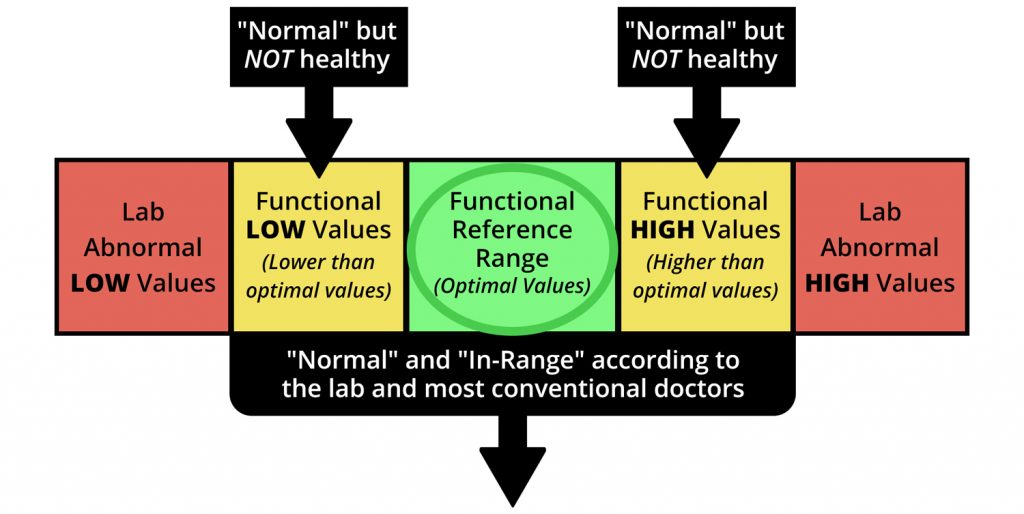
You’ve tried pretty much everything, but you are still struggling with symptoms – doing the right test can often provide that vital information to help resolve your suffering.
How testing may help
- We can really laser focus and personalise your protocols to include the right food for your body needs, correct lifestyle changes that fit around YOUR life as well as therapeutic supplements based on test findings so you can start thriving again.
- You are much more likely to follow recommendations and stay on track. You become accountable to me and to yourself. Let’s face it motivation is often a feeble thing and it changes by the hour!
- You have your baseline – how your body is performing and you can track the progress from there. It’s always good to see things in black and white on paper. Functional testing brings faster successful results and prevents further illness.

The difference between doctor testing and functional testing
When it comes to your lab’s ranges, (the ones your doctor goes by) vs. the functional optimal ranges, you need to understand the difference. Why would the tests your doctor runs come back “normal” yet you still have a ton of symptoms?

The problem with “Normal”

- Firstly, your doctor uses ranges that aren’t optimal. Medical lab ranges are based on the average of the people who get tested at that particular lab you’re drawing your blood at. These people are usually not healthy people. How often are people going to get preventative testing done? Most people who have labs tests done do so because they already have some health issues. These aren’t the people you want your health compared to. So your doctor’s “normal range” is based on an unhealthy population.
- Secondly, the tests most medical doctors use aren’t always the most comprehensive. For example, when it comes to thyroid testing, it is very important to get your thyroid antibodies checked. Often doctors will push back on these, especially if they think your other labs (TSH, T4) are in the ‘normal’ range. But I have often seen normal looking thyroid labs with elevated antibodies. Thyroid antibodies tell us if your body is attacking itself and making antibodies against your thyroid. If you have significantly elevated antibodies then you have the autoimmune disease; Hashimoto’s Thyroiditis.
- Thirdly, your doctor will only ever flag up and do something about biomarkers marked red on your test results. So, for example, ferritin has a range of 10-200 mcg/L. So if your test result ferritin is 11 mcg/L. your doctor will highly likely not even mention it – as it did not flag red on your test results. Even though you are plagued with extreme fatigue, headaches and dizziness, classic symptoms of low ferritin.
- I use functional optimal lab ranges. These are created based on clinical experience from functional medicine professionals as well as well-designed studies and the most up-to-date science. Functional ranges put you in a range that gives you the best chance of preventing disease, which is what we want!
Once your test results are in then I will analyse them and create a specific protocol just for you with food, lifestyle and therapeutic supplement recommendations, so you can finally start balancing and healing your body.
In my practice, I offer several different tests, see the options below

Gut Testing
Our gut stool test is one of the most comprehensive gut test on the market. It uses qPCR & ELISA technology to provide a complete analysis of the GI ecosystem and chronic disease-related microbial markers, which are backed by clinical trials. The test is done in Care Quality Commission (CQC) lab. CQC is the independent regulator of health and social care in England.
Who can gut testing help?
- If you struggle with digestive symptoms such as; bloating, constipation, diarrhoea, flatulence, indigestion, acid reflux, pain or cramps.
- Sometimes symptoms such as PMS, migraines, hunger, joint problems, anxiety and difficulty losing weight may be caused by poor gut health.
- It is prudent for anyone with diseases such as IBS, Chron’s disease, Ulcerative Colitis, or Diverticulitis to check their gut health.

Hormone Testing
I use the Dutch test – the most comprehensive hormone panel test that assesses hormone imbalance in all stages of reproduction from pre-menopause to post-menopause. It is a urine test that shows how your sex hormones (oestrogen, progesterone and testosterone) are doing. It also shows how your body deals with stress (cortisol). Importantly this test includes oestrogen and progesterone and cortisol metabolites which cannot be measured in blood and are crucial to our overall health picture!
The main test biomarkers included:
Can hormone testing help you?
If you have symptoms such as:

Comprehensive Blood Panel + Thyroid Panel Screening
This full blood screening test looks at biomarkers:
Who can comprehensive panel testing help?
If you are struggling with weight, plagued with fatigue, inability to concentrate, cold hands and feet, brittle hair and nails, hair falling out, joint pain, liver problems, high blood pressure, high cholesterol levels, but your doctor is telling you all is normal or prescribing you another pill.
Blood test biomarkers can clarify your health picture and can provide the missing part of the puzzle to your gut and hormone health, as well as other systems in your body.
Functional testing can provide great insight into your health and can prevent future diseases.
Prevention is better than cure – Always.









